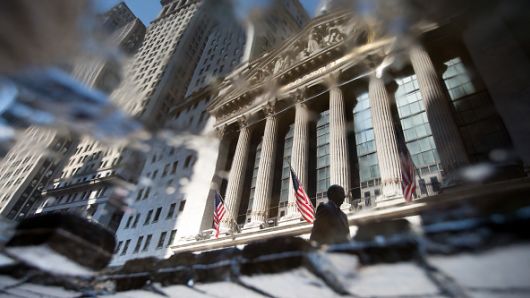
Michael Nagle | Bloomberg | Getty Images
The New York Stock Exchange (NYSE) is reflected in a puddle in New York, U.S., on Monday, June 18, 2018.
Initial public offerings are a dying breed, a phenomenon that has attracted recent attention, especially given the fire hose of emerging tech-related start-ups, The real losers are ordinary investors.
For decades, individuals have participated in the fastest growth segments of the economy by making stock investments through their pension plans, 401(k) accounts and mutual funds. The underlying owners of the majority of these assets are households and individuals.
Once upon a time, high-growth tech companies sought capital by offering ownership to the public rather than to a select group of elite private investors, and this lifted the fortunes of regular people. I know this first hand. My mother, a social worker, contributed monthly to her retirement account, which was mostly invested in Fidelity’s Magellan Fund. That was no accident. When she was first allowed a choice, I was working for Peter Lynch, who managed Magellan. When she died, almost 20 years ago, the assets in her account had growth extraordinarily, thanks in large part to many stellar stocks that we bought as IPOs or small-caps.
Consider that between 1995 and 1999, there were a total of 768 tech IPO’s, an average of 153 per year, including household names like Amazon, eBay and Yahoo. By contrast, during the most recent five-year time period, there have been a total of 106 technology IPOs, an average of only 21 a year.
Until a decade ago, the goal of a successful tech start-up was to go public, which would raise additional funds for expansion and allow the founders and early investors to recoup some of their, money hopefully at a nice profit. Today’s new companies don’t need or even want the public’s money.
Before rolling out of bed, a start-up CEO may find a line outside his or her door of willing private investors with very deep pockets. There is so much available capital from venture capital, private equity, sovereign wealth funds, enormously rich angel investors and tech behemoths like Alphabet, Facebook and Apple, that even juvenile firms with substantial burn rates can avoid the arduous process of a filing, road show, pricing, and the agony or ecstasy of spending innumerable hours with Wall Street bankers.
As shown in the chart below, venture capital funds alone raised over $84 billion in 2017, far above the levels gathered in the last peak, prior to the recession.
 EU News Digest Latest News & Updates
EU News Digest Latest News & Updates



